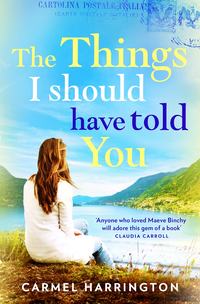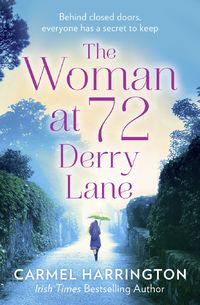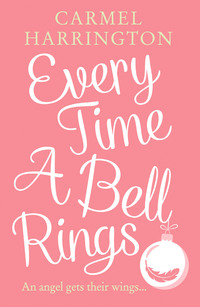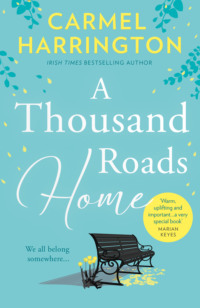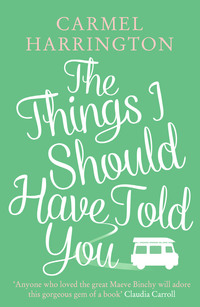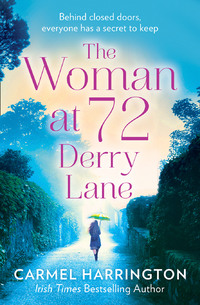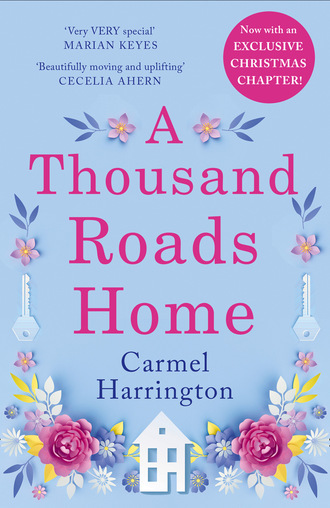
Полная версия
A Thousand Roads Home
‘You keep saying that,’ DJ said.
‘Because it is true.’
DJ sighed, something that Ruth noted he did with increasing regularity. The stress of the past month had made sighing part of his new normal. It was funny how sounds could bring you back to another time. Back to her childhood home where life had been full of sighs. The thing was, despite their regularity, they had the power to cut her each and every time.
The first sigh she could remember was at her four-years-old developmental check-up in the local health centre in Castlebridge, Wexford. Her mother had dressed Ruth in her best dress, a burnt-orange tweed pinafore. She had thick black tights on underneath, which scratched her legs and made her cry. Her mother had sighed and asked, ‘Why must you always be so difficult?’
Ruth did not like seeing her mother upset so she pinched herself hard and tried to make the tears stop. She wanted her mother to look at her with different eyes. With love.
On the way to the health centre, her parents coached her. They were second-guessing what the nurse would ask Ruth. She had tried to listen to her parents’ instructions, determined to succeed, to win, to not be a loser again. But with every question they threw at her and every answer Ruth offered up, she saw her parents throw furtive glances at each other. She could sense that something was not quite right. She wanted to be at home again in her bedroom, wearing her soft pyjamas that were made of pink fleece. She liked how they felt on her skin. They did not itch or scratch like her tights and dress, and they made her feel safe. She wanted to go back to her picture book and read about Angelina Ballerina. Instead she had to sit in a cold waiting room with hard plastic chairs and dirty floors while her parents told her to act like a normal child.
‘I want to go home,’ Ruth decided, and she felt her arms begin to fly. She wished she was a bird so she could disappear into the blue sky. Back home. Back to safety. Back to her normal.
Her mother’s exasperated sigh filled the air with tension. ‘Oh, Ruth, stop that right now. People will stare! Why must you always be so difficult?’
Ruth had sat on her hands, shamed, scared and tearful.
A lifetime of sighs and sorrys. Now her son was in on the act, too.
‘DJ,’ she whispered, and her hand hovered in the centre of the car, in the space between them. Only a few inches away from each other yet it felt like an unbridgeable gulf. She let her hand drop into her lap and she looked back out through the window.
3
RUTH
‘It’s not your fault,’ DJ said, finally, in a voice that was older and more knowing than it had any business to be. ‘It’s Seamus Kearns. I hate him. The … the … fucker.’
Ruth looked at her young son in shock. Had he just said that? DJ’s honest, innocent face jarred with his foul language. She was not naïve enough to believe that he had never used bad language before, but this … this really was out of character. One of the rules of their family was that they had a swear-free home. As much for her as him because, in truth, she enjoyed a good expletive.
Ruth wanted so much for DJ: an education, friends, social acceptance, a life without offence. Because offending people had been, and still was, a regular occurrence for her.
‘Hate is a strong word, DJ,’ Ruth said. Had it been any other day, she would have been cross with him. But she had to concede that on a day that involved losing your home, a few concessions had to be made.
‘You hate him, too,’ DJ said.
‘That is incorrect. I would say I abhor his actions. But hate is a negative, angry and all-encompassing emotion. He is not worthy of taking up that much space in my head. Or yours.’
DJ’s resentment filled the air between them, contaminating their close unit. She felt at a loss, knowing that she must, as the adult, find a way for them both to get through this. She turned to face him, then moved her hand an inch closer to his, letting her fingertips brush the top of his. He looked down and she saw a ghost of a smile inch its way back onto his face. He squeezed her hand for a moment then released it back to her lap.
It was a start. She would find a way to do better.
DJ turned his attention back to the blur of Dublin as they drove through the city. Their taxi came to a halt at a pedestrian crossing. Ruth looked up and watched an old man, unshaven and dirty, wearing a long grey overcoat, begin to cross the road. By his side was a dog with a long and silky strawberry-blonde coat. The man raised his hand in small salute to the taxi driver, thanking him for waiting. He walked slowly, with a slight limp on his right leg. He had a rucksack on his back and something about him – his clothes, his hair, the collar of his coat turned up to protect him from the chill in the air – brought a lump to Ruth’s throat.
Where is he going? Does he have a home?
Then a car behind them blasted its horn, impatient to get on with its journey. They all jumped in unison, including the dog, who stopped suddenly, causing the old man to crash into it. Like a deck of cards, he tripped and fell to the ground, his rucksack spilling its contents onto the road.
‘Probably pissed,’ the Uber driver said, looking with annoyance in his rear-view window at the car behind, whose driver continued to blast the horn.
‘His dog tripped him up,’ Ruth said, feeling the need to defend the old man. She watched a red-and-white flask escape his rucksack and roll towards their car.
‘Where you going?’ DJ asked in surprise when Ruth opened her door.
‘To help.’ She ran over to the flask and picked it up before it disappeared under their car.
‘That’s mine!’ the old man shouted at her, back on his feet again.
Ruth shook the flask gently to see if it had broken, relieved to hear only the swoosh of liquid inside, not broken shards.
‘It is unharmed,’ she said, handing it over to him. His boots were brown. Scuffed and worn. Like him.
He stuffed the flask back into his rucksack, looking at her curiously. Was she imagining it or did he look surprised? Without any further comment, Ruth counted the steps back to their Uber.
‘I don’t know why you bothered, love. His kind would stab you as soon as look at you,’ the taxi driver said. ‘Only last week I saw one of his lot robbing a handbag from a woman. Witnessed it from this very car.’
Ruth glanced towards the man still standing on the side of the road, watching her intently, his head tilted to one side. For a split second their eyes met and he raised his hand and saluted her. And in that gesture, Ruth had the strangest feeling she knew him. She had seen that salute before, she was sure. The memory teased her but refused to show itself. It was gone. And so was he when he turned away and walked in the opposite direction, his dog by his side. Her imagination was playing tricks on her.
‘Why did you do that?’ DJ asked.
‘Because it was the right thing to do,’ Ruth replied. She nodded towards the back of the Uber driver’s head. ‘Do not write off people based on how they present themselves to the world. You should know that better than anyone. Everyone has a story, if you take the time to listen.’
As their car moved on, the old man disappeared from her view but not from Ruth’s mind. She supposed he could have a home. But something about the way he retrieved his fallen items and put them back into his rucksack made her think that his home was in that bag. His face looked weathered in a way that suggested it had been exposed to the outside elements twenty-four-seven. Had life changed as quickly for this man as it had for her and DJ? In only four weeks, they had gone from home to homeless. Four short weeks that had been the longest of her life. When their landlord, Mr Kearns, gave them notice to leave their two-bedroomed flat, he set their life into a tailspin. Ruth was never late paying the rent, even by a day, which meant some months were leaner than others. But Mr Kearns did not care about that.
He had walked into her kitchen and opened up a cupboard above the sink, two months previously. Then pulled out a mug, laughing as he said, ‘It’s a mug’s game, this landlord malarkey. I’m getting out. Selling up.’ His eyes narrowed as he turned to look at Ruth. ‘Make me an offer if you like. Can’t say fairer than that.’
Ruth knew when someone was making fun of her. She recognised the tone, one that she had heard many times in her life.
‘I can’t maintain the rent. Not at the levels they are at,’ Mr Kearns said, in a manner that implied he was talking about the weather, not their eviction.
‘You raised the rent by twenty per cent only a year ago,’ Ruth interjected.
‘You can blame our government for the mess they’ve landed us all in. I can’t raise the rent for another two years, because of these new laws they’ve made,’ Seamus replied, picking up cushions on their sofa and examining them, before tossing them back.
Ruth had been relieved when she’d read about the changes to the Irish rent laws. Naïvely, she believed it meant that she would not have to worry about a further increase until 2020. By then she would have a council house. Only she realised now that although they were on the housing waiting list with Fingal County Council, they were as likely to win the lottery as they were to get a house. Ruth had heard the phrase ‘You are only two pay cheques away from the streets.’ As it happened, for them, the number was one.
Ruth felt panic begin to mount inside her once again, as she sat in the back of the car. Then Odd Thomas’s voice whispered to her, as it had done for over a decade whenever she needed help, calming her, supporting her:
Perseverance is impossible if we don’t permit ourselves to hope.
It was his name, ‘Odd’, that made her choose the book in the first place at her local library in Wexford. She had been called that on more than one occasion in her life. For different reasons from his, she found out soon enough. Odd could see and talk to dead people, and used this skill to help the Chief of Police in Pico Mundo to solve murders. Odd’s world in the USA became as real to her as the one she herself lived in in Ireland. She read the book in one glorious sitting the first time, then picked it up to read again the following day. Then something extraordinary happened on a damp, grey morning in spring. She watched her classmates playing basketball in the school yard, chatting in groups of twos and threes, happy cliques. A thought crept into her head, insidious and mean. If she disappeared, faded to nothing, who would miss her?
And that was when Odd Thomas spoke to her for the first time. Be happy. Persevere.
That very line was one of her favourites from the book. And she knew immediately what it meant. Ruth would have to work extra hard to be happy. But if she never gave up hope, she could find happiness. Thank you, Odd.
And so their friendship began: she trying her best to be happy; he reminding her that perseverance was necessary to achieve that end. Of course, Ruth knew that Odd was not real. She was neither stupid nor delusional. Just alone.
She looked across the seat to her son. For him, she would fight. She would find them a home again. He would never feel alone.
4
TOM
Bette Davis nuzzled Tom’s hand again, her apology for knocking him off his feet earlier. ‘It’s OK, girl,’ he said to his dog, ruffling her coat behind her ears, the way she liked. He leaned back into the curve of his park bench. His home now, he supposed, as it was where he spent most of his nights. Bette rested her head on his feet. Tom closed his eyes. His breathing slowed down and his lids flickered, heavy, until every sense lost its place in the now and went back in time to his dreams, to his happy place, to his home …
Tom stretched his aching muscles upwards, knowing that a locum was a priority. He couldn’t keep this pace up for much longer. His bones ached, older than his forty years. His small general practice had grown to the point that Tom had to turn new patients away. And patients were beginning to complain that the usual twenty-minute waiting time for their appointment was stretching towards an hour. That didn’t sit well with him.
His receptionist, Breda, poked her head through his door. The sound of the Spice Girls singing their Christmas hit ‘Too Much’ drifted in towards him. He stood up and heard his knees click in protest. He needed to get out for a run. He’d been saying that to himself for the past two months. But somehow or other, another day would go by and he’d find himself falling onto his couch, tired and hungry, exercising his fingers with the TV remote.
‘What’s the plan for the weekend?’ Breda asked.
‘Not listening to the Spice Girls. That’s for starters,’ Tom said.
‘Would suit you well to find a Spice Girl for yourself.’
‘Would be a lucky lady to get me,’ Tom said, smiling. ‘But if she’s out there tonight she’ll have to wait. Because my only plan is to head to Tesco. I need to replenish my poor cupboards, then it’s home to catch up on some sleep.’
‘It’s no life you have,’ Breda said. ‘Good-looking man like you.’
‘Stop flirting with me,’ Tom joked.
Breda waved her hands at him and grinned, ‘Oh, you, you’re such a messer.’
‘What are you up to this weekend, Breda?’ He watched her tidy her reception desk, switching off the computer. She looked as tired as he felt. Was he expecting too much from her? Probably.
‘I’m going dancing. Don’t laugh. I told you not to laugh!’ Breda said when Tom’s face broke into a grin. ‘Himself has it in his head that we should learn how to ballroom dance. I’m not sure I’ll ever be Ginger to his Fred, though.’
Tom walked over to Breda and grabbed her hand, spinning her around 360 degrees. ‘I don’t know. I reckon you have all the moves.’
She laughed as she pushed him away. ‘Get away out of that! Maybe thirty years ago. But I’m nearly sixty now!’
‘Never, you don’t look a day over forty!’ Tom didn’t miss a beat and she beamed. They had formed their mutual appreciation society nearly fifteen years previously, when he’d opened the practice. He would be lost without her.
They both groaned when the doorbell rang. Who on earth was calling at this late hour? They had cleared all appointments and it was now twenty minutes past their closing time.
‘Is it Ben, maybe?’ Breda asked. Sometimes Tom and his solicitor friend had a drink together after work.
‘Not tonight. He’s got a hot date with a new woman called Orla. Right now he’s dousing himself in aftershave.’ He unlocked the front door to a young mother with a young child in her arms, wrapped in a blanket.
‘Siobhan!’ Breda exclaimed, walking towards the woman.
‘I saw the light on. I hoped you were still here,’ Siobhan replied.
‘We were just about to walk out the door,’ Breda answered.
Siobhan’s face clouded with anxiety. ‘I’m worried. Daniel’s chest is really bad. His wheeze has gotten worse.’
Breda looked at Tom, ready to take his lead. Technically they were closed. Surgery hours were explicit on the sign at the front of their office.
‘You did the right thing coming,’ Tom said, shrugging his jacket off. Daniel looked smaller than his four years, his face bleached white.
Breda was unsurprised. Her boss had a big heart. It was one of the reasons she loved him like her own son.
Once they got into Tom’s office, Daniel climbed off his mother’s lap and stood in front of the doctor. Daniel knew the drill – he’d been here so many times before. He lifted his top up before he was asked, so that Dr Tom could listen to his chest.
‘Good man. Big deep breath for me. Hold it. And exhale,’ Tom said. ‘You’re a great fella. Do that again for me.’
Tom took his temperature, which was high, and looked in his ears and throat. ‘His left lung doesn’t sound good. The wheeze is particularly bad there.’
Siobhan wrung her hands back and forth. ‘I knew I should have brought him in earlier today. But Lulu has a bad cold. And I didn’t like to bring her out. She’s been so bad-tempered with it all. Gerard was away working. As soon as he came home, I told him I had to bring Daniel to see you. I rushed here as fast as I could. I’m so sorry …’
Tom put his hand up to stop the apologies. The woman would have a heart attack if she didn’t let herself off the hook. Nothing like a mother’s guilt. Unnecessary in this case. Her children were idolised and well looked after. ‘You were right to come to me.’
An hour spent on Tom’s new nebuliser made Daniel a new boy. Tom walked them both to the door with a prescription in hand. ‘If anything happens during the night that worries you, just go straight to A&E. But I think he’s going to be OK at home with the steroids.’
‘Bye, Dr Tom,’ Daniel said. He looked better already and was walking beside his mam now, holding her hand. Seeing how much improved the little fella was made the late night worth it. He locked up and jumped in his car. With a bit of luck, with traffic on his side, he’d make the supermarket before it closed.
The store announced its imminent closure as Tom raced up the escalators. He grabbed a trolley, ignoring the look of annoyance on the spotty-faced store assistant, who was restocking the baskets and trollies. The last thing he wanted was a last-minute trolley dasher like Tom to delay closure of the store. ‘Sorry, buddy,’ Tom said. ‘Promise I’ll be quick.’
He went straight to the pre-packed meal counter to cut out any procrastination on what to buy or, indeed, cook. Not quite home cooked but marginally better than living in the chipper all weekend. If he was fast he could hit the booze aisle to grab some beer too. It was Friday night, and while he was planning a weekend of little else but a book and maybe a bit of TV, alcohol would play a part, too.
His parents would be horrified if they knew he wasn’t going out this weekend looking for love. They were obsessed with his social activities and he found himself making up events that he’d been to just to satisfy them. Not that he was short of social opportunities. He just didn’t want any of them right now.
Tom was one of those people who always had lots of friends. He was born with charisma. His mother used to say that from the moment he arrived into the world people would stop and stare at him. He would lock his big brown eyes onto theirs and they were putty in his hands. In school kids loved him. His easy-going nature, coupled with a quick wit, made him good company. Children and teachers alike gravitated towards him.
This aura that surrounded him followed him through to university. His best friend, Ben, would watch him sail his way through his classes, making friends and finding new girlfriends without breaking a sweat. Whereas he always had to try harder. And whenever he complained, asking him what his secret was, Tom would answer, ‘I’m a charming fecker, that’s how.’
And he was. People liked him.
But even charmers like him need a chance to recharge batteries every now and then. The savage hours in work were taking their toll.
But, if Tom had finished his day at 6 p.m., as was originally planned, he would never have met Cathy. And that would have been the greatest tragedy. Cathy liked to think that something else governed their destined meet-up that day. Fate. Tom thought it was dumb luck. Either way, it was the start of everything.
In the shadow of the bench, Bette Davis looked up when she felt her master shift to the right. Even though he had his eyes closed, he was smiling. He was happy. He was home.
5
RUTH
Ruth was never late for an appointment. If she made a commitment to be somewhere, you could rely on her. Even with the unscheduled stop for the old man and his dog, Ruth and DJ were waiting outside the front entrance of Parkgate, ready to see the council, five minutes early. At 10.01 a.m., Ruth began to feel agitated.
She willed the door to open, wondering how many steps there were between the door and their scheduled appointment. When the door swung open moments later, she said to the brown-lace-up-loafer man, ‘You are two minutes late.’
‘Not by my watch, missus,’ the man replied, not one bit put out by her comments.
‘Excuse me? Are we in the 1950s? I am neither Mrs, Ms, nor Miss. I am Ruth.’
His bewildered face gave DJ a fit of the giggles.
Ruth and DJ picked up a black sack each, balancing it on top of a suitcase. Then they wheeled them into the hall following the signs for the Central Placement Service. One hundred and two steps. Ruth and DJ placed their bags against a wall on their left, which seemed as good a place as any to leave their worldly goods. Then they settled down to wait. From previous interactions with the council, Ruth expected that to be at least thirty minutes. She came prepared and placed her headphones on, hoping Westlife’s harmonies would block out the hundreds of horror stories she’d read online in support forums about other families who were in the same predicament as her. They were difficult to silence and over the past twenty-four hours had been, lingering inside her head.
I slept in my car for nearly two weeks. Gas thing is, I woke up at three o’clock every morning, at the exact same time. The cold woke me, or the nightmares, maybe both.
Laoise
We left the kids with my mother. She doesn’t have room for us all. But I can’t have them in the hostel. It’s not right. Not for anyone but definitely not for them.
Jude
They can’t find us emergency accommodation. Hotels won’t take our family of six. We’re too big. They want to separate us. But without each other, what’s the point of anything?
Gerry
I gave away all our clothes and possessions, except for one bag each. Not because I didn’t want them any more. But because I had nowhere to put them.
Ursula
The desperate words of these families kept her awake at night and haunted her during the day.
Plan B was one she could not contemplate. Could she do it? Ask her family for help? Which of them? Her mother, her father or Mark?
Pop, pop, pop.
‘Mam.’ DJ nudged her, unease pinching his face. ‘You’re crying.’
She wiped the tears away, surprised to feel their wetness on her cheeks.
‘Ruth Wilde,’ a voice called out.
They stood up and turned to look at each other. DJ’s head now reached her breastbone. He was getting tall and she surmised that within a few years he would overtake her. But despite his physical appearance, despite the fact that his emotional intelligence was far older than his years, he was just a kid. And she was letting him down. Shame on you, Ruth. Shame, shame, shame.
‘It’s going to be fine, Mam,’ DJ said, sensing her anxiety.
‘Ruth Wilde?’ the voice shouted again.
Not everyone is cut out to be a mother, Ruth. That’s what her mother had said. Had she been right all along?
Eight steps till she reached the counter, and with each one Ruth vowed to make this right for DJ. But as she walked, she looked around the small waiting room that was now almost full. She felt the eyes of the room follow her, judging her, questioning her story. She wrung her hands. Ruth felt blinded by an imaginary spotlight, one that was focused on her inadequacies.


